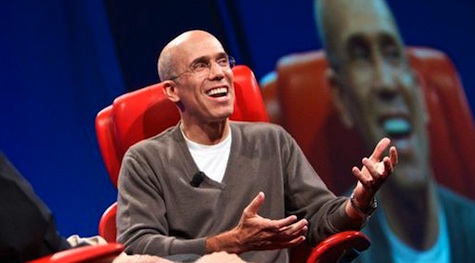-
Katzenberg's Right, the DVD Ownership Era Seems All But Over
At the tail end of an interview with Walt Mossberg at the recent D8 conference, Jeffrey Katzenberg, CEO of Dreamworks Animation SKG, and a long-time Hollywood executive, argued that rapidly-declining DVD sales are "systemic," and should not be considered a "secular" downturn that will reverse itself when the economy improves. Katzenberg believes that what's really at work are fundamentally changing consumer habits. He argued that with DVDs costing $20 or more, consumers are questioning the value of ownership since there are so many other ways to access the film on an on-demand basis (he mentioned Netflix, Blockbuster, Redbox, VOD, iTunes as among the options).
I agree with Katzenberg, but would take his argument one step further. While it is no secret that there are more options than ever for accessing content (as mentioned above), of even more significance is that technology awareness and aptitude - the prerequisites for taking advantage of the choices now available - are deeper and more diffuse in our society than ever.
I have something of a bird's eye view on this subject, because often when I'm in social settings and mention what I do for a living, people become excited to share with me their own personal technology experiences with video and engage in an informal Q&A to understand how the industry works. Though I won't claim to have done a statistically significant study of these conversations, I can say that across generations, technology is being embraced and understood as never before. The old joke about perpetually unset "blinking clocks" on VCRs, attributable to owners' technological ignorance, has given way to a population of tens of millions of broadband-connected, smartphone- wielding, social media-engaged technophiles.
This newfound technology awareness empowers people to make smarter, more value-conscious decisions. The commonplace stories of car buyers educating themselves online so as to level the playing field when negotiating with car dealers is now becoming the new norm in the entertainment business. In other words, it's not just as Katzenberg says, that there are more on-demand, higher value choices all around us (which will only increase further), it's that more and more people are becoming technically savvy enough to understand these options and actually pursue them.
As in other industries, this raises the bar on media and entertainment industry executives to devise transparent business models and pricing that accurately meet consumers' expectations. In the interview, Mossberg and Katzenberg rightly took the notions of "release windows" and multichannel pay-tv bundles to task. While both have made sound economic sense to industry players, to consumers they increasingly appear opaque and archaic, in turn breeding frustration and suspicion.
To extend Katzenberg's argument, the systemic decline in DVD sales shows that technology empowered consumers will inevitably take matters into their own hands, regardless of efforts made to confine their behavior. To guard against broader disruptive shifts in the pay-TV industry, industry players need to be working double-time to update their models, making sure that they fit with consumers' rapidly-changing expectations.
What do you think? Post a comment now (no sign-in required).
Categories: FIlms
Topics: D8, Dreamworks Animation SKG, Jeffrey Katzenberg


